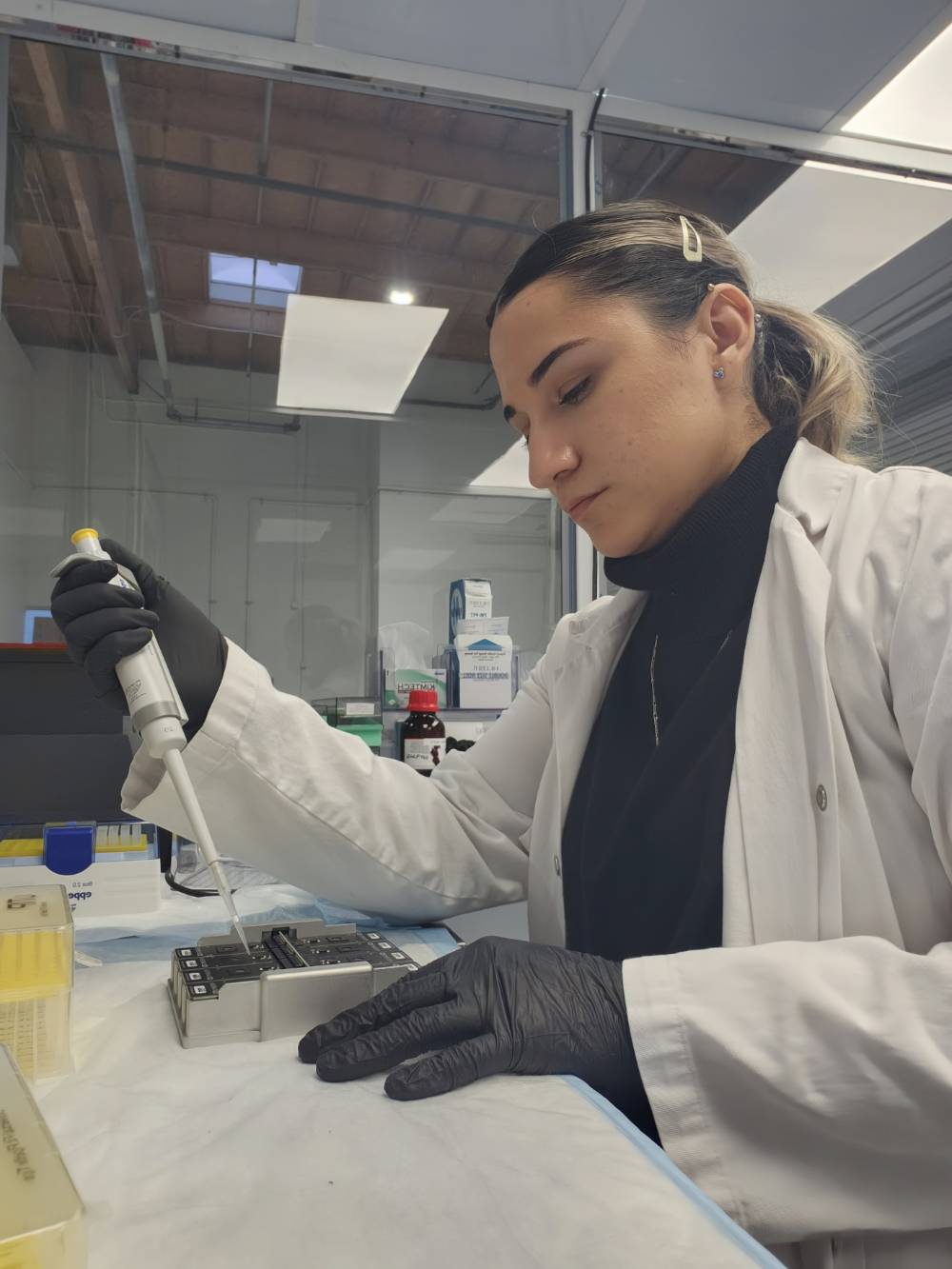
“In paid internships, the work is focused on your career and education goals,” said Amertah E. Perman, the district’s dean of career education and workforce development. “It’s about ensuring that there’s equitable access to your work and your career plans.”
The four colleges in the district – San Diego City, Mesa, Miramar and Continuing Education – have a variety of programs offering paid internships and more are on the horizon as funding becomes available. The district also is collaborating with other community colleges in the region to provide paid internships.
Andrea Vallejo, who recently graduated from San Diego Miramar College, started an internship last July at CRISPR QC, a biotechnology startup. After just six weeks, she was hired full-time as a lab technician.
“If I wasn’t part of the program through Miramar, I wouldn’t have landed with this company,” she said.
Vallejo said the experience was so useful that she would have taken the internship even if she hadn’t been paid, although she appreciated the $20 an hour she received.
“Any real-life experience is valuable in any degree, but especially in jobs that require lab skills,” she said.
A recent study by New America, a Washington, D.C., think tank, highlighted the value of internships based on a survey of students at five community colleges. About 85% of the students said they valued internships to help them pursue their careers. Nearly six in 10 of the students who were surveyed got paid for their most recent internship.
“Community college leaders must begin to see equitable participation in paid (Work-Based Learning) programs as both an economic justice and racial equity issue,” the study’s researchers said.
Sasha Knox, associate dean of strong workforce at City College, said many low-income students cannot afford to participate in an internship unless they are paid.
“Paid internships allow students to not make a choice between meeting basic needs and getting this opportunity,” she said. “It lets our students not have to make the choice between learning and eating, or learning and paying the rent.”
To provide a more diverse workforce for San Diego and Imperial counties, a regional collaborative was recently awarded an $18.1 million grant to offer paid internships to community college students and better prepare high school and college students for the workplace.
The four-year grant focuses on students in four key career paths: business; computing and engineering; health; and education. More than 79,000 students are enrolled in those programs at the region’s 10 community colleges. The grant will fund paid internships for students in the four career pathways, and a greater awareness about internships will be provided to the business community so that a culture develops in which employers are training the next generation of workers.
Perman said state funding also has been provided so that each of San Diego’s community colleges are making several crucial hires: a job placement coordinator to help students find internships and jobs; an employer relations liaison to help increase employer engagement; and a work-based learning coordinator to promote student and faculty involvement in learning through work.
The district also is helping students find jobs through an online job board called Handshake, which provides a one-stop shop for both employers and students. More than 3,000 employers are posting over 4,800 jobs on Handshake, and almost 3,400 students in the district are active on the platform.
Noncredit colleges such as College of Continuing Education have not been allowed to offer paid internships, but that is expected to change soon with recent legislative changes, said Cassandra C. Storey, dean of healthcare careers and community education at College of Continuing Education. The college’s foundation supports a paid internship program for youths aged 16-24 years through its Gateway to College and Careers program.
Alex Berry, associate dean of career and technical education at Mesa College, said the college is working to offer internships to all students instead of internships that were limited to certain students because of funding requirements.
The four-year grant focuses on students in four key career paths: business; computing and engineering; health; and education. More than 79,000 students are enrolled in those programs at the region’s 10 community colleges. The grant will fund paid internships for students in the four career pathways, and a greater awareness about internships will be provided to the business community so that a culture develops in which employers are training the next generation of workers.
Perman said state funding also has been provided so that each of San Diego’s community colleges are making several crucial hires: a job placement coordinator to help students find internships and jobs; an employer relations liaison to help increase employer engagement; and a work-based learning coordinator to promote student and faculty involvement in learning through work.
The district also is helping students find jobs through an online job board called Handshake, which provides a one-stop shop for both employers and students. More than 3,000 employers are posting over 4,800 jobs on Handshake, and almost 3,400 students in the district are active on the platform.
Noncredit colleges such as College of Continuing Education have not been allowed to offer paid internships, but that is expected to change soon with recent legislative changes, said Cassandra C. Storey, dean of healthcare careers and community education at College of Continuing Education. The college’s foundation supports a paid internship program for youths aged 16-24 years through its Gateway to College and Careers program.
Alex Berry, associate dean of career and technical education at Mesa College, said the college is working to offer internships to all students instead of internships that were limited to certain students because of funding requirements.